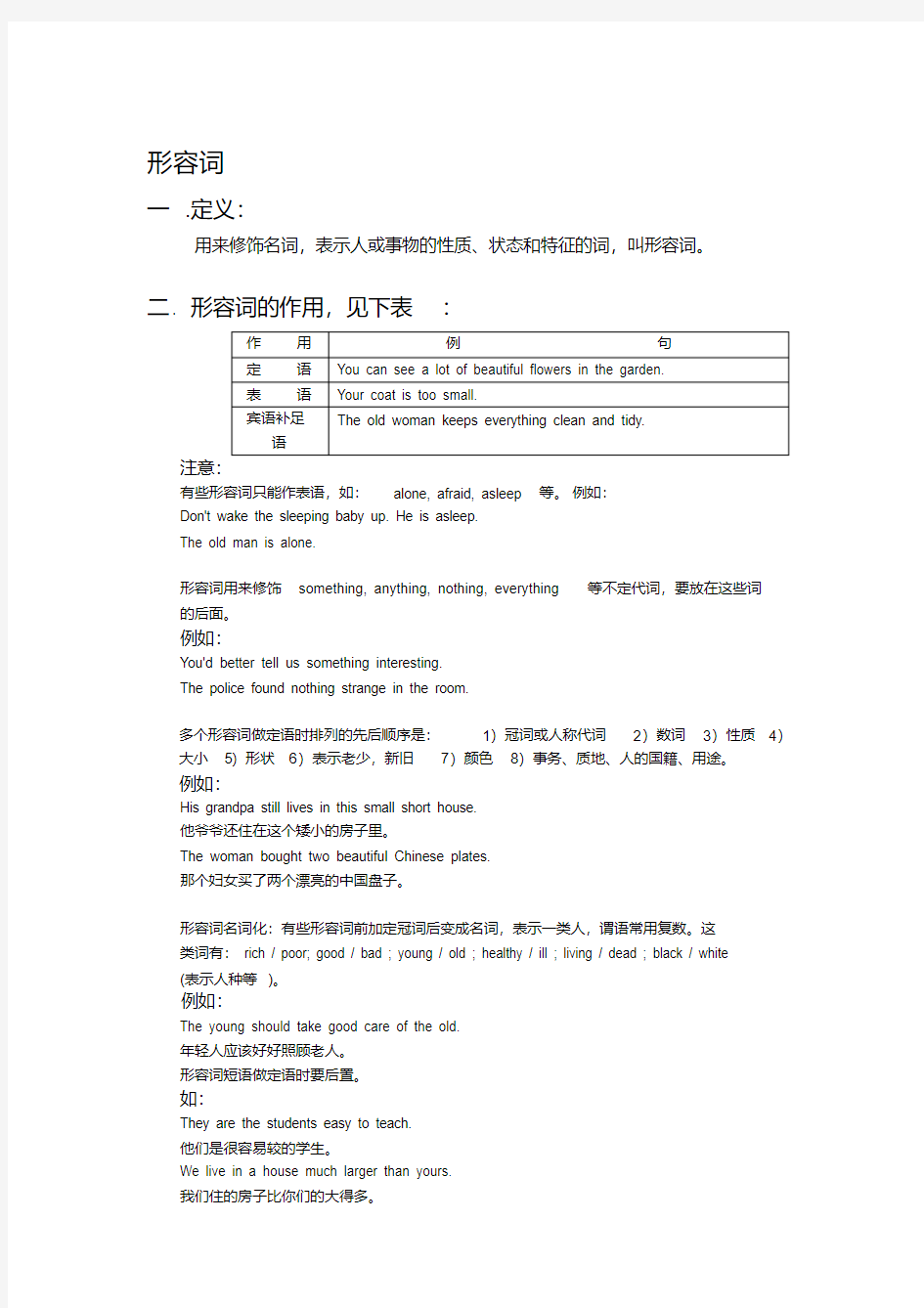初中英语形容词和副词的用法和练习题(20200523121222)

- 1、下载文档前请自行甄别文档内容的完整性,平台不提供额外的编辑、内容补充、找答案等附加服务。
- 2、"仅部分预览"的文档,不可在线预览部分如存在完整性等问题,可反馈申请退款(可完整预览的文档不适用该条件!)。
- 3、如文档侵犯您的权益,请联系客服反馈,我们会尽快为您处理(人工客服工作时间:9:00-18:30)。
形容词
一.定义:
用来修饰名词,表示人或事物的性质、状态和特征的词,叫形容词。
二. 形容词的作用,见下表:
作用例句
定语You can see a lot of beautiful flowers in the garden.
表语Your coat is too small.
宾语补足
The old woman keeps everything clean and tidy.
语
注意:
有些形容词只能作表语,如:alone, afraid, asleep 等。例如:
Don't wake the sleeping baby up. He is asleep.
The old man is alone.
形容词用来修饰something, anything, nothing, everything等不定代词,要放在这些词的后面。
例如:
You'd better tell us something interesting.
The police found nothing strange in the room.
多个形容词做定语时排列的先后顺序是:1)冠词或人称代词2)数词3)性质4)大小5)形状6)表示老少,新旧7)颜色8)事务、质地、人的国籍、用途。
例如:
His grandpa still lives in this small short house.
他爷爷还住在这个矮小的房子里。
The woman bought two beautiful Chinese plates.
那个妇女买了两个漂亮的中国盘子。
形容词名词化:有些形容词前加定冠词后变成名词,表示一类人,谓语常用复数。这
类词有:rich / poor; good / bad ; young / old ; healthy / ill ; living / dead ; black / white
(表示人种等)。
例如:
The young should take good care of the old.
年轻人应该好好照顾老人。
形容词短语做定语时要后置。
如:
They are the students easy to teach.
他们是很容易较的学生。
We live in a house much larger than yours.
我们住的房子比你们的大得多。
else要放在疑问代词或复合不定词之后。
如:
Did you see anybody else?
你看到别的人了吗?
三.以-ly结尾的形容词
1)大部分形容词加-ly可构成副词。但friendly,deadly,lovely,lonely,likely,lively,ugly,brotherly,仍为形容词。
Her singing was lovely.
He spoke to me in a very friendly way.
2)有些以-ly 结尾既为形容词,也为副词,如daily,weekly,monthly,yearly,early 等。
The Times is a weekly paper. 《时代周刊》为周刊。
The Times is published weekly. 《时代周刊》每周发行一期。
副词
一.定义:
副词主要用来修饰动词,形容词,副词或其他结构。
二. 副词的位置:
1)在实义动词之前。
2)在be动词、助动词之后。
3)多个助动词时,副词一般放在第一个助动词后。
注意:
a. 大多数方式副词位于句尾,但宾语过长,副词可以提前,以使句子平衡。例如:
We could see very clearly a strange light ahead of us.我们清楚地看到前面有奇怪的光。
b. 方式副词well,badly,hard等只放在句尾。例如:
He speaks English well. 他英语说得好。
三. 副词的排列顺序:
1)时间,地点副词,小单位的在前,大单位在后。
2)方式副词,短的在前,长的在后,并用and或but等连词连接。例如:
Please write slowly and carefully. 请写得慢一些,仔细一些
3)多个不同副词排列:程度+地点+方式+时间副词。
注意:副词very 可以修饰形容词,但不能修饰动词。
改错:(错)I very like English.
(对)I like English very much.
注意:副词enough要放在形容词的后面,形容词enough放在名词前后都可。
例如:
I don\'t know him well enough. 他我不熟悉。
There is enough food for everyone to eat.有足够的食物供每个人吃。
四. 兼有两种形式的副词
1)close与closely
close意思是\"近\";closely 意思是\"仔细地\"。例如:
He is sitting close to me. 他就坐在我边上。
Watch him closely. 盯着他。
2)late 与lately
late意思是\"晚\";lately 意思是\"最近\"。例如:
You have come too late. 你来得太晚了。
What have you been doing lately? 近来好吗?
3)deep与deeply
deep意思是\"深\",表示空间深度;deeply时常表示感情上的深度,\"深深地\"。例如:He pushed the stick deep into the mud.他把棍子深深插进泥里。
Even father was deeply moved by the film.老爸也被电影深深打动了。
4)high与highly
high表示空间高度;highly表示程度,相当于much。例如:
The plane was flying high. 这架飞机飞得很高。
I think highly of your opinion. 你的看法很有道理。
5)wide与widely
wide表示空间宽度;widely意思是\"广泛地\",\"在许多地方\"。例如:
He opened the door wide. 他把门开得大大的。
English is widely used in the world.英语在世界范围内广泛使用。
6)free与freely
free的意思是\"免费\";freely 的意思是\"无限制地\"。例如:
You can eat free in my restaurant whenever you like.无论什么时候,我这饭铺免费对你开放。
五.各种类型副词的位置
英语中副词的位置和汉语不尽相同,它的位置比较灵活。通常用作状语修饰
动词、形容词、副词等。下面来介绍一下副词的分类方法:
多数副词都可以放在它所修饰的动词后面。如:
He runs slowly.
他跑的很慢。
时间副词、地点副词和方式副词一般放在句末。如:
They went to the park yesterday morning.
